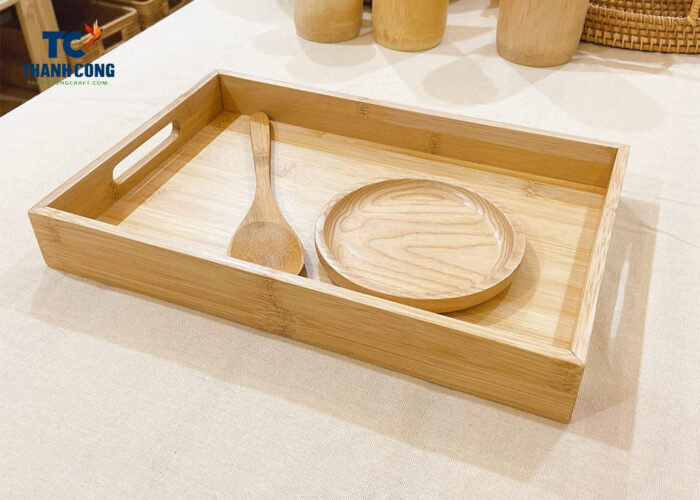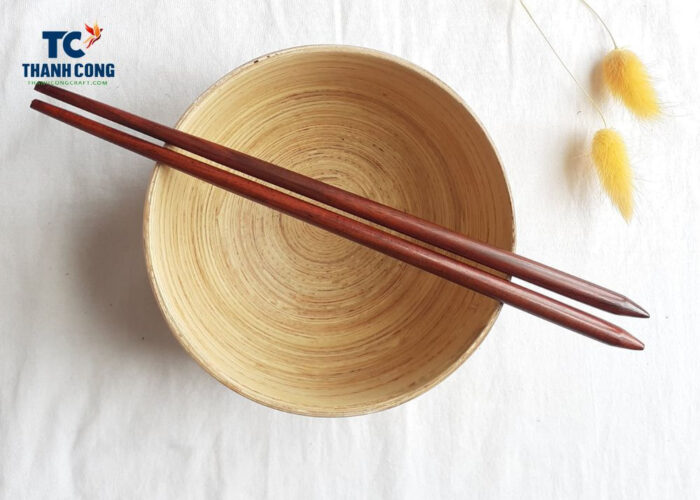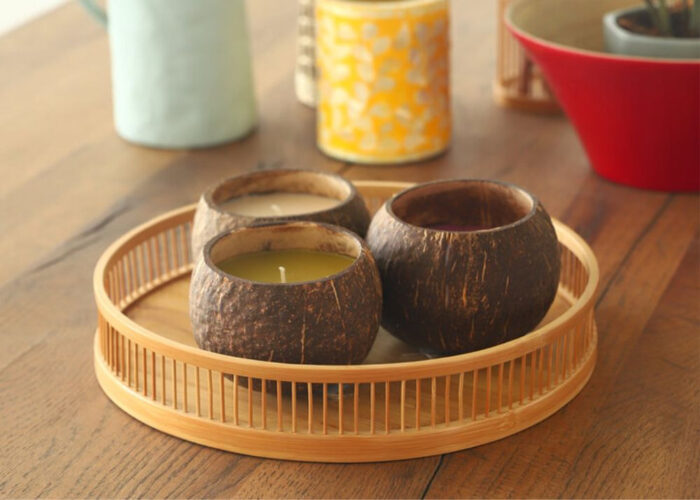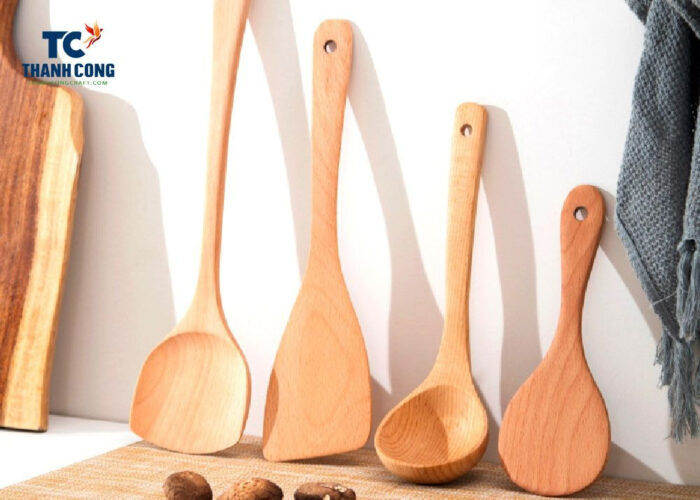Are you considering the addition of bamboo utensils to your kitchen, or perhaps you already have them and are seeking guidance on proper care? Bamboo utensils combine a lightweight and elegant design with the strength to tackle various culinary tasks.
Unlike plastics, they won’t release harmful chemicals or degrade over time, making them a sustainable choice that also adds aesthetic appeal to your kitchen. In the following guide, we will explore how to care for bamboo utensils, ensuring that you cherish and enjoy them as much as we do!
Contents
1. Reasons To Use Bamboo Kitchen Utensils
Passionate about cooking? Embracing bamboo kitchenware? Unsurprisingly, bamboo ranks among the top choices for culinary tools, and there are compelling reasons behind this preference. Discover the seven key factors that make bamboo kitchenware the ultimate choice to fulfill your cooking requirements.

Bamboo Is Sustainable
Bamboo stands out as an exceptionally renewable resource, distinguishing itself from both plastic and wooden utensils. Its rapid growth rate demands significantly less water than other plants. Moreover, opting for bamboo utensils ensures your contribution to preserving the health of our planet – a choice you can make with confidence.
Durable
Bamboo may not seem like the most durable material but don’t let its delicate appearance fool you; it’s actually quite strong and resilient! Bamboo won’t dent easily like plastic or expand with temperature changes like wood will — so these utensils won’t get damaged over time and are perfect for everyday use in the kitchen.
Affordable
Beyond its eco-friendliness, bamboo presents an economical advantage. Quality kitchen tools need not strain your budget, as bamboo utensils often come at a lower cost compared to their metal counterparts, all the while maintaining comparable quality in most instances
Won’t Leave Behind Flavors
Bamboo won’t leave behind any unwanted flavors on your food! This means there’s no need to worry about getting any funny tastes from previous meals interfering with your current culinary masterpiece — what more could you ask for?

Bamboo Has Antimicrobial Properties
While other materials may hold onto bacteria from previous meals, bamboo is actually resistant to bacteria growth due to its unique cell structure and natural antimicrobial properties! This means that even if you forget to wash them immediately after using them, they’ll still be safe to use later on down the road (just make sure to give them a good scrub before cooking).
It Doesn’t Leave Behind Melting Residue
It might be surprising, but some materials (like not-so-durable plastic) can leave behind melting residue when exposed to hot temperatures — which makes it difficult to clean up after cooking sessions in the kitchen. Thankfully, because of its strong nature, this isn’t something you’ll have to worry about with bamboo utensils!
Bamboo Utensils Look Great
Last but certainly not least — let’s talk about how great these things look! Whether it’s the natural grain patterns or rich hue along its surface, there’s no denying that these things look stylish and sophisticated in any kitchen setting
2. How To Clean Bamboo Utensils
2.1 What You Need
Maintaining bamboo utensils’ cleanliness is a simple process, yet specific tools and steps are essential for proper care:
- Gentle scrubbing brush or soft sponge: Opt for a non-abrasive tool to prevent surface scratches on your utensils.
- Warm water and mild soap: Avoid harsh chemicals, as they can harm the bamboo fibers; instead, use a mild soap with warm water.
- Clean cloth: Post-cleaning, employ a clean cloth to eliminate any lingering moisture effectively.

2.2 Step By Step Guide To Cleaning Bamboo Utensils
Begin by rinsing away food particles or residue using warm water. Ensure thorough rinsing of both sides of the utensil before proceeding.
- Apply mild dish soap onto the brush or sponge, and gently scrub away any remaining residues from both sides of the utensil using light circular motions.
- Rinse the utensil with warm water until no traces of foam or suds remain on the surface.
- Use a clean cloth to dry the bamboo utensil completely, eliminating any excess moisture, before storing it in a dry area away from direct sunlight.
3. Tips For Caring For Bamboo Utensils
Once your bamboo utensils are clean, here are some additional tips for keeping them in the best condition for as long as possible:
Enhance Cleanliness with Vinegar Soak
For a thorough and chemical-free cleanse of your bamboo utensils, consider a white vinegar soak. Create a solution by blending one part vinegar with four parts water, immersing your utensils for a twenty-minute soak or more. The vinegar’s acidic properties effectively dissolve accumulated residues, revitalizing your utensils to a pristine shine. Afterward, ensure a comprehensive rinse with cool water and allow them to air dry before using.

Embrace Hand Washing
Did you know that hand washing not only champions eco-friendliness but also yields cleaner utensils? True! Hand washing not only removes stubborn food particles and germs but also enables you to inspect utensils for signs of wear and tear. Though it might require a few additional minutes, the effort is well worth it for these exceptional tools. Devote a brief moment of your day to guarantee the cleanliness and proper upkeep of your bamboo utensils – the reward is undeniable!
Minimize Dishwasher Usage
Discover the significance of sparing your bamboo utensils from frequent dishwasher cycles. While it’s easy to overlook, given our habit of placing various items in the dishwasher, it’s important to note that standard hot water and soap aren’t bamboo’s best companions. This combination can lead to unsightly staining and gradual weakening of the utensils over time.
Beware of Prolonged Water Exposure
Bamboo’s tendency to expand upon contact with water may result in moisture absorption, leading to alterations in shape and potential cracks, rendering your cookware unfit for use. Prevent this by limiting soaking time to the necessary minimum. When cleaning your bamboo cookware, remember to keep a close eye on the clock to avoid unintended complications.
Embrace Wood Oil
Wood oil stands as an integral element in maintaining your bamboo cooking utensils. Whether it’s a bamboo fork, cutting board, spoon, or spatula, this specialized oil acts as a barrier against splintering and ensures the lasting allure of your cookware. Applying wood oil is a breeze – gently coat your utensils with a thin layer of oil, allowing it to sit for 30 minutes before wiping off any excess using a dry cloth. With regular use, wood oil not only imparts a pleasing luster to your bamboo utensils but also extends their lifespan appreciably!
4. Frequently Asked Questions
Q: What Does a Bamboo Cutlery Set Include?
A typical bamboo cutlery set comprises essential utensils crafted from renewable and highly resilient bamboo fiber. It usually consists of a bamboo spoon, fork, knife, and even a pair of chopsticks. These utensils are designed to endure various culinary challenges without succumbing to breakage or discoloration over time. Since most bamboo cutlery sets are reusable, they make an eco-conscious choice by minimizing pollutants in the environment.
Q: What Other Bamboo Products Are Available?
If you believed bamboo was solely relegated to construction and furniture, think again! Bamboo-based items span a diverse spectrum, from the practical to the opulent. Basic products encompass everyday utensils like trays, plates, and chopsticks. Meanwhile, the higher echelons feature designer furnishings, accessories, and fashionable items crafted from exotic bamboo strains.
Q: Are Plastic Utensils Superior to Bamboo?
The debate between plastic and bamboo utensils is intriguing. On one hand, plastic utensils boast convenience due to their affordability and widespread availability. Furthermore, modern plastics often possess recyclable or rapid biodegradability traits. Conversely, bamboo cutlery shines as a sturdier and more environmentally-friendly choice, thanks to bamboo’s innate renewable nature. Ultimately, the choice hinges on your priorities: convenience or sustainability.
Q: How Does Bamboo Conditioning Oil Benefit My Utensils’ Maintenance?
Bamboo conditioning oil stands as a specialized elixir that safeguards the longevity of your kitchen utensils. Tailored for the rigors of daily culinary activities, it offers protection against corrosion, tarnishing, and fading. Regular application of this oil preserves your utensils’ original shine while enhancing their durability – reducing the need for frequent replacements. Remarkably, bamboo conditioning oil is easily applied using a cloth or paper towel and is also budget-friendly. So, for those aspiring to create culinary masterpieces, investing in bamboo conditioning oil ensures your utensil arsenal remains robust.
Q: Why is My Bamboo Cooking Utensil Warping?
Though a common concern, the issue lacks a simple solution. Like many natural materials, bamboo has a propensity to absorb moisture and subsequently warp. This phenomenon can occur from prolonged water exposure or leaving the utensil in the sink after washing. Unfortunately, replacing the tools when necessary appears to be the primary remedy. However, you can mitigate the risk by avoiding prolonged water submersion, air-drying the utensils post-washing, and storing them in a low-humidity environment.
If you have any further questions, don’t hesitate to send thanhcongcraft an email us at [email protected] or message us at WhatsApp: +84967485411. Hope to serve you soon! Best regard!
Check out for more: Kitchenwares and Bamboo News


